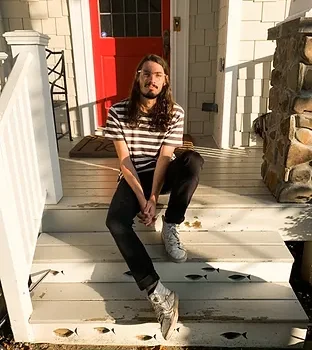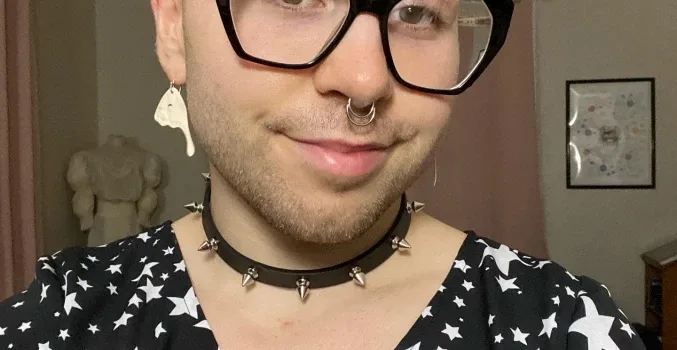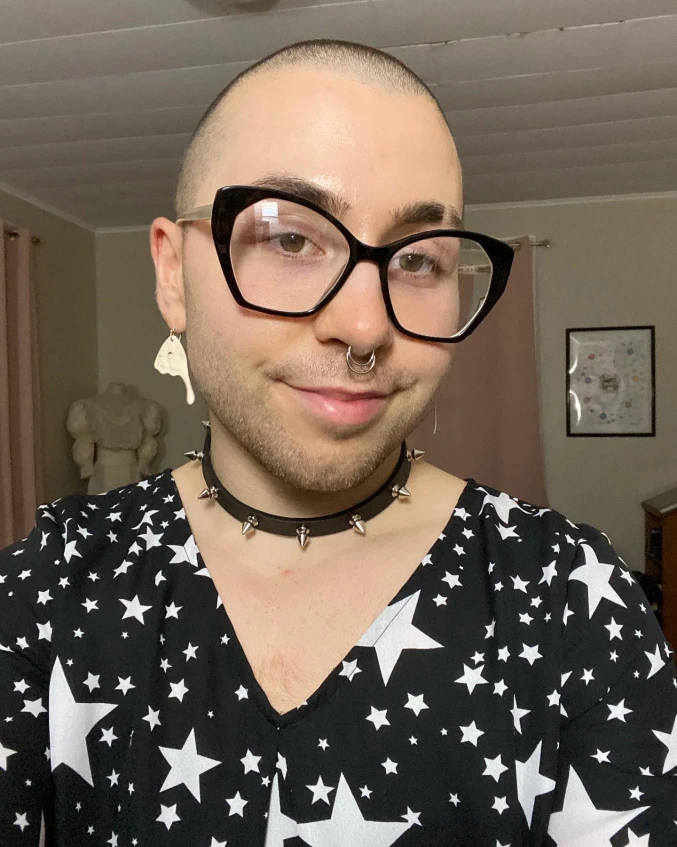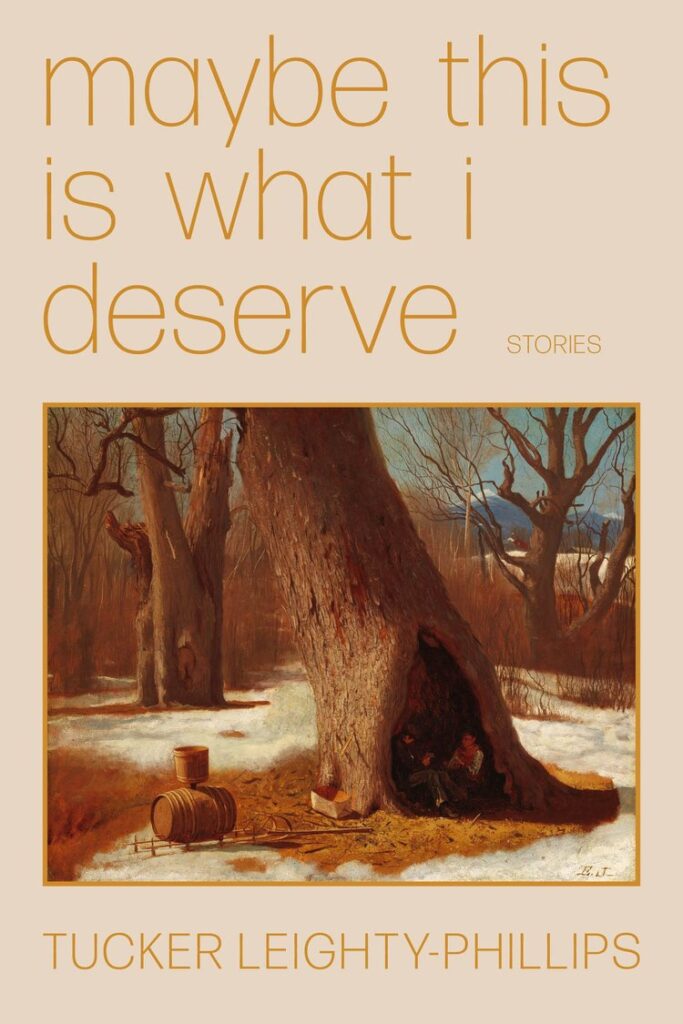
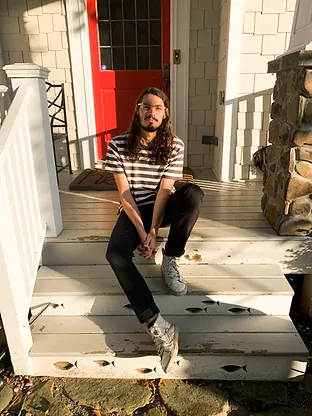
Congratulations to Arizona State University alum Tucker Leighty-Phillips for his upcoming flash fiction chapbook Maybe This is What I Deserve, published by Split/Lip Press. It won the 2022 Split/Lip Chapbook Contest, selected by Isle McElroy. Leighty-Phillips explores themes of childhood innocence, parenthood, and existentialism rooted in everyday life. His collected stories demonstrate compelling prose and unrelenting authenticity delivered with concision.
Each story in Maybe This is What I Deserve is funny or melancholic, sometimes a little bit of both, as seen in the story “Togethering.” Leighty-Phillips’ precise diction layers atmosphere in his succinct tales that gets richer through rereads. Other stories showcase his ability to play with structure and white space, such as in “Another Story” and “The Rumpelstiltskin Understudies,” which makes this collection perfect for readers who want to read something familiar yet refreshing.
With prose that constantly surprises and pleases, Maybe This Is What I Deserve is the kind of flash collection that will make you rethink how you see the world. Beneath the arresting imagery of sweaty mashes of bills and noses flowing like gratitude is the heartbeat of an author equally invested in language as character. These stories shock, they entertain, and they stick in your mind.
Isle McElroy, author of The Atmospherians and People Collide
Tucker Leighty-Phillips is a writer from Southeastern Kentucky. He is the author of Maybe This Is What I Deserve (Split/Lip Press, 2023), and his work has been featured in Adroit Journal, The Offing, Passages North, and elsewhere. Find him on Twitter at @thenurtureboy and on his website.
I love Tucker Leighty-Phillips’s wild imagination, his privileging of the emotions of childhood, his ability to find the magic that’s ever-present in the messiness of community. In Maybe This Is What I Deserve, Leighty-Phillips delivers us a surrealism suffused with joy and generosity and wit, grounded in sincere love for Kentucky and for the irrepressible potential of its people.
Matt Bell, author of Appleseed
Maybe This is What I Deserve releases June 20th, 2023. You can pre-order it here.
We had the pleasure of interviewing Tucker Leighty-Phillips about his book and writing process. This interview was conducted over email by our Blog Editor, Antonio Folcarelli.
Antonio Folcarelli: Many of the stories in Maybe This is What I Deserve speak to childhood and parenthood. What inspired you to write from these perspectives?
Tucker Leighty-Phillips: I grew up in a primarily single-parent household, and a lot of my childhood experience was filtered through that. Having one parent meant our household only had one income, and one person to raise myself and my sisters. It was a tremendous task, and my mom really worked hard to ensure we were safe, fed, and happy. I think a lot of these stories are a means of processing what that was like for me, now that I’m older and can differentiate my childhood from other people’s childhoods, and these stories are also a space to explore what that experience must have been like for her. When you’re a kid, especially one in a low-income household, you don’t realize all the structural factors working against you, or the systems meant to help that aren’t helpful. I wanted to try to revisit some of those situations from a new point-of-view, particularly that of the parent.
AF: One quote the collection opens with is by film director, producer, and screenwriter Wong Kar-Wai:
“One’s memories aren’t what actually happened—they’re very subjective. You can always make it much better.” Why did you choose this quote?
TLP: Many of the stories in here are autobiographical, at least partially, even in some small way, and I think many of these stories invoke memories for me. I liked having a reminder to myself that each story, and each memory embedded within the story, is an attempted reconstruction of whatever my experience was. Sometimes I’ve benefited from hindsight, and sometimes that hindsight has frustrated or upset me. I wanted this collection to be a space of thoughtful nostalgia–not one that simply yearns for another time, but interrogates it.
AF: What challenges did you face in layering humor, intimacy, and poignancy in flash fiction? How do you keep emotional depth concise?
TLP: Great question! I’ve always kind of grappled with this. I want to be serious, but not melodramatic. I want to be playful, but not flippant. It’s a game of fine margins in that way. I am trying to navigate how much humor will help accurately portray the heart of the thing I’m writing about. Sometimes, a punchline helps alleviate some of the tension of whatever I’m exploring in a story, and gives me a sense of positive emotional reflection. Sometimes, it doesn’t, and feels like it takes away. That’s why stories like “Groceries” or “Toddy’s Got Lice Again” are in there–they are stories about feelings that I really want to be earnest about, and felt that humor took away from that earnestness. I don’t always get that emotional tenor right, but it’s always being tweaked.
AF: What works or authors do you turn to for inspiration?
TLP: I think it depends on the day, my mood, and what project I’m working on. For MTIWID, my primary inspirations were people like Deb Olin Unferth, Lucy Corin, Ana María Shua, Meredith Alling, Ross Gay, Zachary Schomburg, and Louis Sachar. But I also have a lot of non-literary influences that always shine through in my work. The Adventures of Pete & Pete is a big one–it was a television show that really made the mundane aspects of rural/suburban life feel really expansive and fantastical. I also really love cartoons and the narrative logic that exists within them–Looney Tunes, Scooby Doo, Courage the Cowardly Dog. I always try to let my writing create its own internal logic, and I do my best to let it guide me.
AF: The story “Stages of Grief” was co-written with Rachel Reeher. How did collaboration affect your writing process?
TLP: Every single collaborative project is different, depending on the partnership, the process, the medium–so each one kind of shifts my perspective on how collaborative work is done. Rachel and I are a couple, so there’s a lot of trust already instilled between one another. I had an idea, but wasn’t sure how to go about it, and she helped bring a lot of the idea into tangible language. Technically, there’s one other collaborative project in the collection–”The Rumpelstiltskin Understudies (play)” uses a drawing made by my then-eleven year old sister. I didn’t tell her what I was working on or how it fit into the narrative, but she trusted me and made something that really expanded the story.
AF: What projects are you working on now?
TLP: I’m a little scattered, but I will mention the thing that is the furthest along–especially since it relates to the prior question. I’m currently working on a collaborative anthology, where each writer contributed a fiction piece based on a prompt, but didn’t know what anyone else was working on, and ultimately created a vast, innovative, sometimes contradictory worldbuilding project. The title is still TBD but it’s in the final editing stages now!
